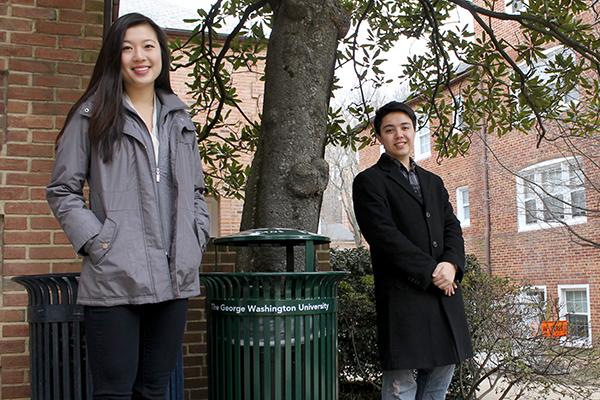Two students are working with University officials to begin teaching residents of a Mount Vernon Campus residence hall how to compost.
Student Association Sen. Frank Fritz, CCAS-U, and senior Sophia Lin said they want to launch a composting program in Hensley Hall and later expand it to other halls. That could help GW reach its goal of becoming completely waste free – just one tenet of a multi-pronged plan to reduce its environmental impact.
Lin said that the pilot, which could launch some time this semester, would give one compost bin to each room in the residence hall with labels for what can and cannot be composted. Hensley is home to fewer than 40 students, according to GW’s housing website.
“It requires a major behavioral change, and not everyone is necessarily aware of how composting works or what actually can be composted,” said Lin, who is leading the program as part of a Clinton Global Initiative project.
Ari Massefski, the president of the Residence Hall Association, said Fritz and Lin have met with Hensley’s hall council but not yet with GW’s Division of Operations.
“So we were happy to point them in the right direction and will continue to work with them to flesh out the possibility of a composting program in one of the residence halls on the hillsides,” Massefski said.
Fritz said student leaders would try to work closely with the hall, checking in with all the residents, to ensure the pilot’s success.
“We’re going to go very extensive with this one dorm, really engage with each individual there,” Fritz said. “Get their RHA on board. Get their [resident adviser] on board.”
Gregory Evanylo, a professor in the department of crop and soil environmental sciences at Virginia Tech, said composting projects are more often successful when officials take an educational approach. Staff might need “to get into that waste and pull out some of the non-compostables by hand” before people know exactly what can be composted, Evanylo said.
Stan Slaughter, founder of Tall Oak Productions, which aims to teach students how to sort compostable material, also said starting a program is “a massive project on education.”
Students need straightforward directions for separating materials into compost and trash bins, Slaughter said. He recommends putting a sign above the compost bin with lists of compostable food items and attaching actual items that are compostable as examples.
“You can glue a rumpled up napkin onto the sign. You can glue the paper cup on the sign,” Slaughter said. “When a person is coming to get rid of [their waste], they’re not going to want to spend a long, long time translating words into physicality.”
Two weeks ago, University sustainability officials said D.C.’s infrastructure could not handle widespread composting. The nearest commercial composting facility is in Prince George’s County, Md., but it is not large enough to accommodate the amount of compost materials GW would bring.
Fritz and Lin will look into maintaining a small compost facility where the materials could decompose on the campus. Without a facility, the composted materials would likely be sent to the Prince George’s County location, though there would be fees associated with the transportation.
“We’re very much an urban institution, so you have to take into account transportation costs to get that compost out and balance the cost and emissions of transporting it with what you’re saving from landfills,” Lin said.







